-
Posts
170 -
Joined
-
Last visited
Content Type
Profiles
Forums
Events
Posts posted by 512dude
-
-
If there was G-spotr can you link us to the thread?
Thx
PS.
This link has a nice pictoral discussion... Anchor Analysis
-
I read this article at the ASCA's website and was wondering what you guys think and what you typically use? Anyone seen any empirical data on the issue?
_____________________________________________________
" The Sliding X "
Many climbers use a "sliding X" to equalize two pieces - ususally beginner climbers with bolt anchors. You should NEVER use this except in two specialized cases (see below). While the sliding X does equalize the pieces, it assumes that neither could break, since if one does break, there is severe extension in the system - enough that it would likely cause the carabiners to break. Since it assumes neither piece would break, it's a stupid system - if neither would break, there's no need for equalization. If one might break, then there is WAY too much extension. This is why many call it the "death X." Instead, use one sling off of each bolt or piece. You can tie one shorter to approximately equalize the pieces if needed.
The two cases where the sliding X is used:
equalizing tenuous pieces in a larger anchor - for instance, two poor nuts in a large natural pro anchor. The nuts are equalized, then the sliding X is equalized with other pieces through a cordelette, webolette, or other non-extending method.
equalizing two very tenuous pieces in extreme aid - for instance, a hook and a bashie on A4 terrain.
-
Here is a nice shot of the NEW Spire routes and the corner that looks much better from afar.
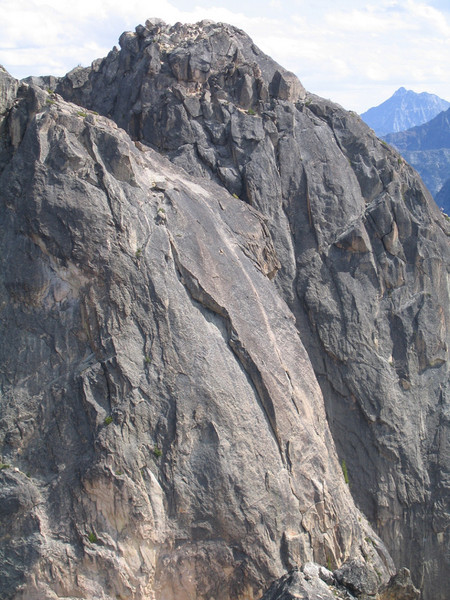
-
What: In the winter of 2007 two local PNW climbers left for South Africa to get a taste of the famed and highly acclaimed rock climbing in Waterval Boven. Said to be some of the best climbing on the planet and kept a local secret, it was time to check this out for real. What these guys didn't know is that they would get involved with making climbing a part of a social-economic solution to address local issues such as unemployment, crime and issues of inequality. Together in discussions with local climbers Gustav Janse van Rensburg and Glenn Harrison and local land owners a plan was hatched and a non-profit was established to provide funding for:
(a) training and employing locals in support of outdoor recreation activities
(b) procuring access to local lands for trail building/maintenance and crag development/maintenance
© facility improvements for climbers and outdoor enthusiasts
(d) promotion and education of outdoor activities
To help support the non-profit's goals, I am selling guidebooks to the area on behalf of Roc'n Rope (www.rocrope.com) and its' principle Gustav Janse van Rensburg. At the same time Glenn Harrison has attempted the 2007 Freedom Challenge, a 2300km mountain bike ride across South Africa to help raise more funds for the project (http://www.rocrope.com/mtbike.html)
You too can help us and get a gift in return. Make a $25 donation and as a gift you will receive the guide book "THE RESTAURANT AT THE END OF THE UNIVERSE CRAGS".
The guide book is in color and describes over 500 sport and trad climbs. It is complete with color photos, overview maps, route descriptions, details about traveling to and around South Africa, places to eat and stay, shops, services and contains a brief history of the area as well. I have included sample photos from the book as well.
Where: Waterval Boven, Mpumalanga Province, South Africa
When: September - April (southern hemisphere reverse seasons)
Why: Climb some of the best rock this planet has to offer with awesome alternate activities including bouldering, white water rafting, mountain biking, trail running, caving, hiking and quick access to Kruger Wildlife Reserve, Swaziland and Mozambique. Now there are about 800+ routes all of high quality on solid quartzite rock including the 5 star Snap Dragon and the 5.14 Jabberwocky.
Please contact me at climb@miraiusa.com if you are interested in helping out.
Thanks!


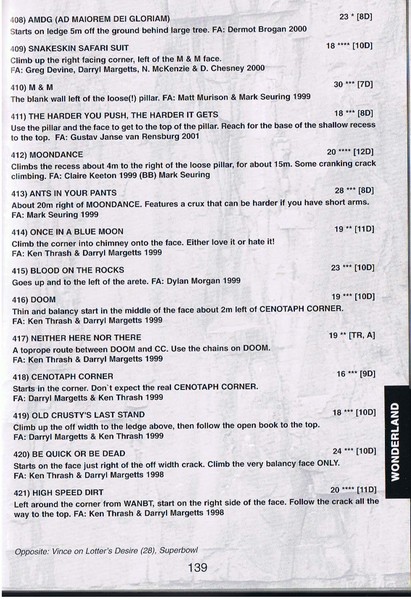
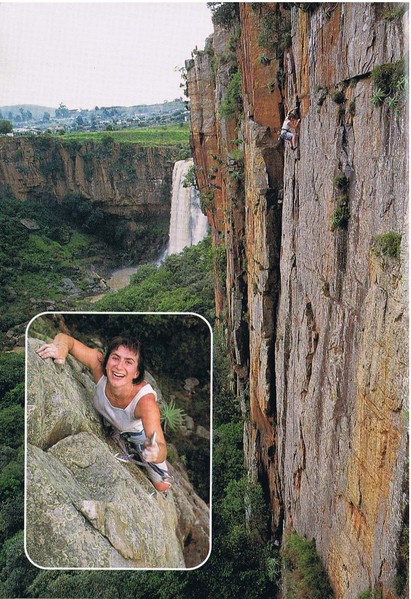
WHO'S YOUR DADDY - 5.10a (not kidding!)
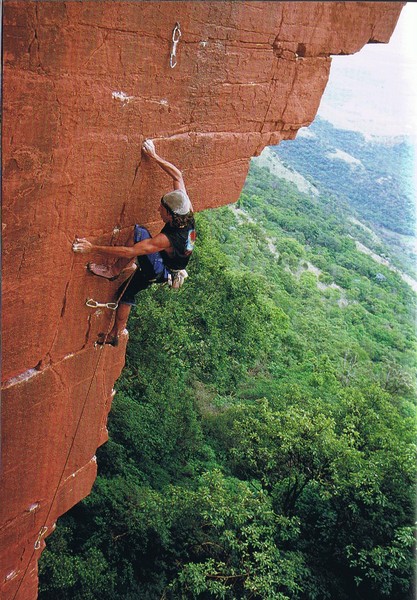
LOTTER'S DESIRE - 5.12
I considered where I should post this but none of the other forum topics seemed more appropriate so my apologies if this is in the wrong forum.
-
hey this ain't no dating service xxx

-
Kane,
I'll PM you my info and if you want to get in touch ring me and we'll chat about climbing. Not sure how much my partner will want to do and maybe 3 wouldn't be so bad.
Check your PM's
Chris
-
wtf? I don't know what your talking about, I have had great luck on this site!
Audrey,check your PM I sent you some info.
Cheers,
Chris
Sorry dood but this isn't a dating service.
-
-
Lucik & Cricket,
I am close to you and thinking of heading over with another on Tuesday. I am looking at the following routes:
South Early Winter Spire,Direct East Buttress,5.11,10 pitches
North Early Winter Spire,West Face,5.11,7 pitches
North Early Winter Spire,FlyCatcher/E. Buttress,5.10b,10 pitches
Chianti Spire,East Face,5.10,6 pitches
Vasilki Ridge/Juno Twr,Clean Break,5.10c,13 pitches
Cedar Creek Wall,Solitude,5.9,13 pitches
Cedar Creek Wall,Estatic Cling,5.9,13 pitches
I will see if my partner bails or not and if you want to car pool it might be a good plan eh?
Chris
-
Audrey,
check your PM I sent you some info.
Cheers,
Chris
-
We just walked the stream in our runners and avoided the bush bash. They dried nicely in the sun.
Good suggestion re the Tevas.
-
Raindawg,
seems like we have been given clearance to proceed with the discussion here if you'd like.
If not thanks for the sharing.
-
Because RainDawg feels threatened and I want to continue the discussion with him I offered the alternative.
RainDawg said: "So although I appreciate the work put into the latest extended comments of "512dude" and "billcoe", I think they belong elsewhere in a separate topic. Perhaps in "Rock Climbing" or "Access"...(I don't think ethical issues should be categorized as "spray"...maybe we need a new category for controversial topics.)
So...I'm not addressing this stuff here anymore...they might kick me off...again...and maybe you too. "
-
Gentlemen (and I use that term lightly)
can we take it here and I'll buy the next round!
http://www.cascadeclimbers.com/forum/ubbthreads.php/ubb/showflat/Number/703148/page/1#Post703148
Thanks,
c
Raindawg and everyone else -Feel free to continue the discussion on this thread. This trip report itself explicitly encouraged bolt discussion. One thing everyone can leave out is smart ass comments and visuals.
-
Trog,
I found the pitch before the off-width more of the crux. Looking down from the belay at the 5.9 off-width that prior pitch looks like this and the traverse undercling out to the edge of the flake is the fun bit!
There is a reasonable amount of 5.8-5.9 climbing. The undercling pitch has a one move crux, but is fairly sustained 5.8 up to the crux. The offwidth is 5.9 for about 15', then it starts to ease. I think there is also on more short 5.9 bit after the OW pitch, but I remember this being pretty straightforward. -
R,
I appreciate your response and dialogue. You mention that the "major tangent" is being covered elsewhere and I would like to read more and participate. Could you point me to the discussion please.
With regards to our on going discussion:
I agree that climbers are a growing community but in relation to other activities such as hiking or mountain biking we are still small in numbers and we do govern ourselves with coalitions such as www.washingtonclimbers.org, the Access Fund, etc.
You realize the growth in the local community and contrast our current era with "...a time when ...everybody knew, or knew of, everybody else" but this is far from the situation and let's be thankful that forums like this exist for us to communicate. With the growth in numbers come new perceptions and ideas of what defines climbing. The inclusion of activities that are now considered climbing and exist at the periphery of the climbing envelope are diverse and has created a group that has similar and competing interests. You are clear that "Untold thousands of people call themselves 'climbers', whether they play in the confines of a gym or are alpine big-wall masters and everything in between." So how do we accommodate all these climbers? As you said, a great deal of climbing happens on public land and you and I don't own it so we best come up with a plan on how to educate the new users and share these recreation areas. Not to mention the other groups ie. mtn bikers, hikers, trail runners, ORV'ers, etc. - but let's just deal with our own community.
So with this understanding you obviously realize change is bound to occur and this change will impact your personal choices and challenge your perception of climbing. But you must also realize that just as you have had the right to challenge the past generation of 'old timers' and their ethics so will the next generation challenge yours. I bet you climb with sticky rubber shoes, lighter aluminum carabiners, Dyneema slings, thinner light weight nylon ropes, chalk, camming devices and other modern climbing amenities. I am sure I can find some 'older & wiser' climber than you that thinks your ethics are a disgrace because of your choices. However, that is the era you grew up in, the way you learned how to climb, the choices you made that you considered ethical and that have made you the climber you are today. It is the same process that the next generation of climbers will employ and they are taking for granted sticky rubber, chalk, rap bolting, bolts, chains, topos etc. as if they were always there and a given part of climbing and they will adopt these as 'standards' unless they know otherwise and are given the knowledge to make a choice. You said it yourself "...it would be...fair...to say that most new climbers don't have a clue that there is controversy about placing bolts or other provocative environmental issues." How do you expect them to know??? The only way they could know otherwise is if individuals such as yourself educate them, show them another way and teach them about the past and your personal ethics.
However, it doesn't mean your way is the right way or only way - it is just a way. If the new climbers choose not to follow your path and enjoy sport climbing then there isn't much you can do about it because it isn't your choice, it is their choice and no matter how much ranting and bolt chopping you do there will be more of them than you. The most we can do is set a good example and work together to resolve these issues. I'm sure you know the cliche "strength in numbers". As far as Infinite Bliss goes it seems like some individuals have done just that. They have worked with the land managers to come up with a plan.
http://www.washingtonclimbers.org/Current/Infinite.htm
Now if you choose to act on your own and go chop or modify the route, it would seem that you are no different than those that took it upon themselves to put the route up. (Although they had at least attempted to investigate the sensitivity of this area and were apparently hampered by misinformation and out of date topographical information.) Your actions would be the same but only with different intentions.
So I choose to discuss these issues with my fellow climbers, build a sense of continued community, help establish some new standards and preserve the old, use logic/reasoning and sensitivity to what others find pleasurable and hence valuable to help improve the situation. I hope you will join me and other climbers and continue to be as open with your thoughts and opinions as always but before you take action discuss it with all of us who haven't violated the Wilderness Act, who do act as stewards of the land, who work with the land managers & other interest groups and employ our own sense of ethics when consider these sensitive issues.
Sincerely,
c
Why do you think it is a better option to do whatever you want with rock routes vs. discussing options with the first ascentionist? Perhaps you have some good reasons/intentions and it would help me/us to understand your reasoning.This is becoming a major tangent covered in depth elsewhere, but here are some brief comments (believe me, I could go on and on) to answer your inquiry:
Raindawg,You are correct that this rule isn't law but what is law anyhow? A set of rules/guiding principles which we agree to abide by so that anarchy doesn't exist. It just happens we climbers are self governed and as a small community we do respect each others interests in climbing and the routes that get established. You do confirm that you have knowledge of the unwritten rule yourself but choose not to agree.
I don't believe that climbers are any longer a "small" community nor necessarily even a "community". There once was a time when it was somewhat self-policing because everybody knew, or knew of, everybody else. In the present day where climbing is mass-marketed, it's a different universe. Untold thousands of people call themselves "climbers", whether they play in the confines of a gym or are alpine big-wall masters and everything in between. Some of us find sport-climbing, with its reliance on trails of permanent anchors, to be a warped permutation of climbing, if not utterly illegitimate, and unfortunately, it has become the status quo. The learning curve is very short and the easy gratification is satisfying. I think it would be a fair statement to say that most new climbers don't have a clue that there is controversy about placing bolts or other provocative environmental issues.
Some of us think a lot of the routes established today are shameful and bogus...including sport-bolting on traditional crags and in the mountains e.g. "Infinite Bliss". In such cases I think the only reason to talk to a "first ascensionist" doing these sorts of things is to ask him to desist or to clean up his mess.
Additionally...most climbing areas are on public land. They aren't owned by any "first ascensionist". The obligation is to be a good steward. If I see someone damaging our environment, I might choose to address the problem with or without the blessing of such "F.A."'s.
we do respect each others interests in climbing and the routes that get established.Not necessarily so. See the above.
You do confirm that you have knowledge of the unwritten rule yourself but choose not to agree.I choose not to agree to the extent that it interferes with my own sense of ethics.
I hope this clarifies some things or perhaps introduces you to another perspective.
Thxc
you're wlcm
r
-
Nice! Thnks for shoring the pics. I've been thinking abput the NW Corner Of NEWS. How strenuous was the off-width?
It was nice temps the day we did the route but realize that the valley was seeing 90+ degrees!
The off-width is an off-width and once the arm and leg are in there one just has to relax with enough body tension to readjust. Like the other dudes said, it is relatively short and then face holds appear and options show up. It is similar to the OW on Backbone Ridge on Dragon Tail. If you want to shore up on OW go to Leavenworth and do a few and then go do it but it is well protected with 4" cams so no worries.
This is further up the corner when it eases...
Enjoy!
-
Raindawg,
You are correct that this rule isn't law but what is law anyhow? A set of rules/guiding principles which we agree to abide by so that anarchy doesn't exist. It just happens we climbers are self governed and as a small community we do respect each others interests in climbing and the routes that get established. You do confirm that you have knowledge of the unwritten rule yourself but choose not to agree.
Why do you think it is a better option to do whatever you want with rock routes vs. discussing options with the first ascentionist? Perhaps you have some good reasons/intentions and it would help me/us to understand your reasoning.
Thx
c
I believe this "unwritten rule" has been around longer than you have been climbing.
Everyone has heard of this "rule", but:
a) it's not a law;
b) not everyone agrees with it, including myself;
c) there will always be exceptions...the FA's, for example, were not consulted when Dan's Dreadful Direct was retrobolted nor when it was subsequently chopped.
And no one's necessarily going to be consulted when IB or other routes of similar ilk get the chop.
You climb.....right?Longer than you've been alive, junior.
Now go refill your sippy cup and watch a few Barney reruns.

-
Trip: Washington Pass - N.&S. Early Winter Spires - NW Corner & SW Rib
Date: 7/10/2007
Trip Report:
I hooked up with Kevin and we decided to give the following routes a go:
North Early Winter Spire - NorthWest Corner 5.9
South Early Winter Spire - SouthWest Rib 5.8
The approach took about ~1.5 hours and needs simple approach shoes nothing else at this time. With a lunch at noon the routes themselves both went in 2.5-3 hours each moving at a moderate pace.
Coming off North we rapped the gully and used 2x60m. South Spire descent we used the South Arete and down climbed to the last 200' which we descended in one rap.
The bugs were thick but the temps were nice and comfy at around 70's for the day.
Gear Notes:
Take two or three 4" cams (3.5 and 4 Camalots) for the off-wdith crux on NW Corner and one 4" for the SW Rib route. Otherwise a medium rack with mostly cams and a few nuts.
Approach Notes:
Trail is clear and snow is almost all gone. Should be with hot temps in the valley.

WA Pass View - Panaroma
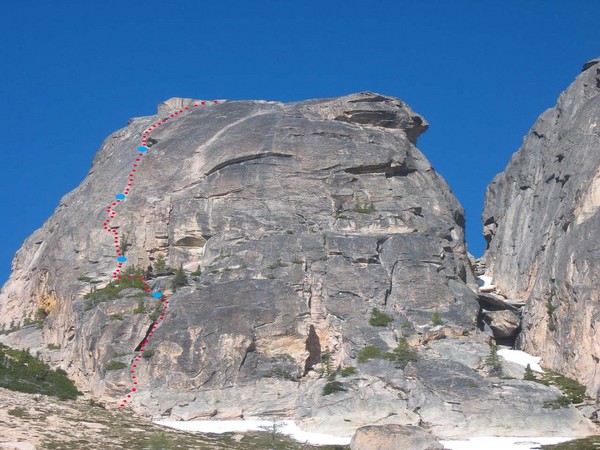
North Early Winter Spire - NW Corner Route
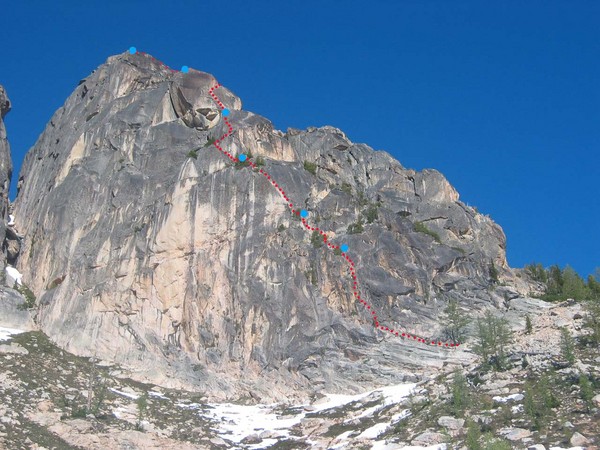
South Early Winter Spire - SW Rib Route
-
Anyone know how to get in touch with the FA?
Thx
-
North Cascades - thanks.
-
Ivan,
my latest squeeze fawk'in thanks you for your kind fawk'in words mate.

-
Spotly,
Have you climbed the route? The current state is that if one falls in this choss section of the climb they can count on a high probability of going down 1800' or so to the ground. If I have the alternative of a bolt every 50' vs. not having any anchors at all I know where I want to be. Again the climbing isn't terribly difficult at most 5.5 and not consistent. If you consider someone needs to ascend 5.9/5.10 to get there I don't think they'll have an issue with technical ability but I see it more of an issue of chossy rock which is loose and unreliable and the fact that this also needs to be down climbed when descending. Think of the weather going to shit and having the rock wet or a climber with an injury and not having rap stations in just these sections. It makes the route seem incomplete. It's really a safety consideration and doesn't make sense when the rest of the route is equipped with anchors and the alternatives for pro are pretty much nil.
-
I think I posted a similar comment here Prior Post
My trip report is here.
________________________________________________
PRIOR POST
Q1: Why were the lower pitches bolted so heavily?
The first 5 pitches of this route follow some non-descript line up what is basically a dry waterfall for most of the year. The climbing is in the <5.5 range and is fairly straight forward but there seems to be a bolt every 4 to 10 feet! Why was it necessary to make a ladder up these pitches? I think this has aggravated some traditionalists to the point where some of the hangers have been hammered over in protest. I am not an advocate of unsafe climbing but the pattern of bolting seems ridiculous given the angle of the rock, the fall potential and the difficulty of climbing.
Q2: Why are there so few bolts from pitch 13 to pitch 17?
So whatever logic was used on the bolting for pitch 1-5 all went to hell on pitches 13 thru 17. Again the cimbing is all <5.5 and easy going but now there are huge stretches, 400+ feet, of shitty loose rock and very little to no pro. Although we unroped and solo'd this section for our own safety, I don't see how this is to be useful as part of a bolted 'sport climb'? The risk is greater with the poor rock quality that one might fall and if 1/2 of the bolts from pitches 1-5 were used on these upper pitches there would be minimized risk on the route for injury. Accidents impact more than the climbing party; costs of rescues and the time and effort involved are additional impacts and climbing related fatalities have their own broad reaching affects. A bolt every 50' to prevent ground fall would make the a huge difference. In addition to climbing up was the task of getting back down. We had to down climb these pitches until discovering the anchors somewhere around the 13th or 14th pitch. If we had to do this in the rain on wet rock or with an injured climber this would have increased the issues significantly.



Self Equalizing or Sliding X Anchor
in Climber's Board
Posted
Cat,
can you provide your source? Where did you get this info and who did what testing?
Thx,